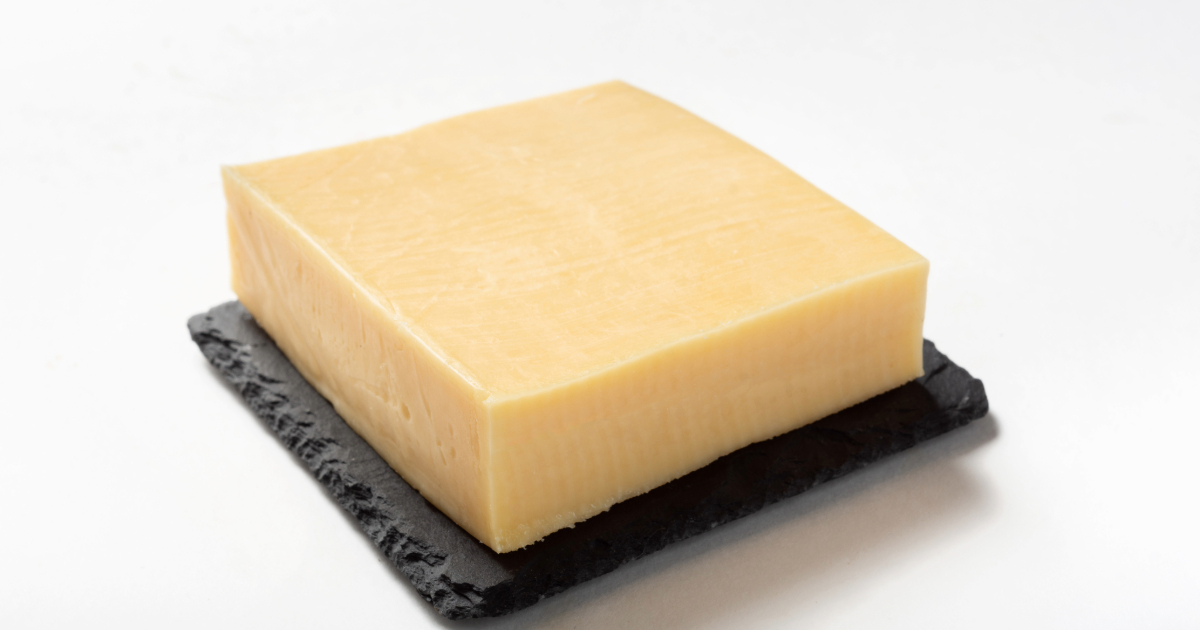Eden is a popular processed-filled cheese brand made by Mondelez International and sold primarily in the Philippines.

Eden cheese was first created and marketed in 1981 by Kraft Foods Philippines, the Philippine subsidiary of the major American food company Kraft Foods. It was billed as an affordable, tasty, and nutritious processed cheese option for Filipino consumers.
The brand was named "Eden" as a reference to the bountiful Garden of Eden, emphasizing the cheese as a wholesome, natural product. Early marketing positioned it as a cheese filled with "goodness in every bite."
Over the years, Eden became one of the most recognized cheese brands in the Philippines. After Kraft Foods split into two companies in 2012, Eden became part of Mondelez International's portfolio of brands. It continues to be a popular staple cheese in Filipino households today.
Eden Cheese Ingredients
Eden is classified as a "processed filled cheese food". This means it is made by blending natural cheese (like cheddar) with other ingredients like emulsifiers, milk products, and stabilizers to create a smooth, uniform texture.
Here are the main ingredients found in Eden cheese:
- Natural cheese - Usually a mix of cheaper hard cheeses like cheddar or edam. Provides the classic cheesy flavor.
- Water - Adds moisture and helps blend the ingredients.
- Vegetable oils - Usually coconut, palm, or palm olein oil. Adds smooth, creamy texture.
- Milk powders - Dried milk proteins boost the dairy content.
- Food starches - Thickeners like corn or tapioca starch.
- Emulsifiers - Emulsifying salts like sodium phosphate help bind ingredients.
- Preservatives - Potassium sorbate prevents mold growth.
- Vitamins & minerals - Added nutrients like vitamin A, vitamin B2 (riboflavin), and calcium.
- Salt - For flavor.
Eden cheese is real cheese blended with water, oils, milk proteins, starches, and emulsifying salts to create a shelf-stable processed cheese product. The ingredients provide protein, vitamins, and a smooth, creamy texture.
Nutrition Information
A 100g serving of Eden cheese contains about:
- 300 calories
- 23g fat (20g saturated fat)
- 13g carbs (3g sugar)
- 10g protein
- 850mg sodium
So it's high in calories, fat (mostly saturated), and sodium - similar to other processed cheeses. The actual nutrient amounts can vary between different varieties.
Eden does contain a boost of calcium and vitamins A and B2 added during manufacturing. But overall, it's considered more of a treat than a healthy everyday cheese due to the high saturated fat and sodium content.
Flavors and Varieties
There are a few main varieties of Eden cheese available:
- Eden Original - The classic creamy, mild Eden cheese. It has a smooth, spreadable texture.
- Eden Quickmelt - A version designed to melt faster and have an ultra-smooth, gooey texture.
- Eden Singles - Individually wrapped cheese slices.
- Eden Cheez Whiz - A squeezable "cheese sauce" similar to Cheez Whiz.
- Eden Spread - A soft, spreadable cream cheese-style product. Often flavored with herbs.
- Eden Cheddar - A natural cheddar cheese marketed under the Eden brand.
Special seasonal flavors are also sometimes released, like Eden Quezo de Bola during Christmas which mimics the flavor of Filipino edam cheese (queso de bola).
Most Eden cheese products have a mild, creamy flavor profile. The original Eden cheese is known for being relatively sweet compared to other cheeses.
Key Takeaway: Eden is sold in multiple varieties - original, quickmelt, singles, spread, cheddar, and special flavors - but all have a characteristically sweet, mild, creamy taste.
How is Eden Cheese Used?
Eden cheese is used in many popular Filipino dishes and snacks. Here are some of the most common ways it's used:
- Melted or grated over pasta, rice, meat, vegetables, toast, etc.
- In dips, spreads, and sauces as a creamy base.
- Sandwiched between bread or crackers for quick snacks.
- In pastries, baked goods, and desserts for added flavor.
- Sprinkled on top of soups, salads, and other dishes as a finishing touch.
- Swirled into beverages like hot chocolate or coffee to make creamy drinks.
Eden's mild flavor and creamy meltability make it versatile for many cooking and snacking applications. It's commonly paired with bold Filipino flavors like tocino, longganisa, adobo, and sisig. Outside the Philippines, Eden can be substituted in any recipe calling for processed cheese slices or sauce.
How to Store Eden Cheese
To maintain freshness, Eden cheese should be stored properly:
- Unopened - Store in a cool, dry place away from direct sunlight. Avoid high heat or humidity. Refrigeration is not needed until opened.
- Opened - Reseal the package tightly and refrigerate. Use within 7-10 days for best quality. If mold grows, discard.
- Shelf life - Unopened Eden cheese lasts for months past the "best before" date printed on the package. Keep an eye out for any bulging or leaking packages.
Like most processed cheeses, Eden cheese can last for quite awhile if stored correctly before and after opening. Keeping it tightly sealed in the fridge is the best way to maximize freshness once opened.
Is Eden Cheese Healthy?
While Eden cheese does contain some nutrients from the added vitamins and minerals, it is considered more of an indulgent treat food rather than a health food.
Some drawbacks from a nutritional standpoint:
- High in saturated fat - 20g per 100g, which is a substantial amount. Saturated fats raise LDL ("bad") cholesterol levels.
- High in sodium - 850mg per 100g is over 1/3 of the daily recommended limit. Too much sodium can increase blood pressure.
- Low in protein - Only 10g per 100g. Much lower than natural cheeses.
- Highly processed - Made with emulsifiers, thickeners, and other additives. High processing removes nutrients.
- Sugary - Contains 3g of added sugar per 100g. Added sugars provide empty calories.
On the plus side, Eden cheese can be an enjoyable part of an overall balanced diet when consumed in moderation. The small amounts of calcium, vitamin A, and B vitamins are beneficial. Just be mindful of portion sizes due to the high fat, salt, and sugar content.
Is Eden Cheese Vegetarian?
Yes, Eden cheese is vegetarian-friendly and does not contain any meat ingredients. However, some varieties do contain animal-derived ingredients:
- The regular Eden cheese contains milk and milk proteins. So it is lacto-vegetarian (contains dairy).
- The Eden Cheez Whiz and Eden Spread products contain small amounts of rennet - an enzyme derived from cows' stomach linings used to coagulate the cheese. Rennet makes them unsuitable for vegetarians who avoid animal by-products.
Always check the ingredients list on the package to see if non-vegetarian ingredients like rennet are included in a particular Eden cheese variety. The original Eden cheese and most others are lacto-vegetarian.
Key Differences From Regular Cheese
There are some important ways that Eden cheese differs from regular natural cheeses:
- Texture - Eden has a uniform, smooth, creamy texture rather than the crumbly or firm texture of natural cheese.
- Flavor - Eden is much milder in flavor and slightly sweet compared to the sharper, tangier taste of most natural cheeses.
- Melting - Eden melts smoothly without separating or becoming stringy. Natural cheeses melt in a thicker, sticky, oozy way.
- Nutrition - Eden is lower in protein and calcium than most natural cheeses since it contains non-dairy fillers. But it's higher in sodium.
- Cost - Processed cheeses like Eden are generally cheaper than natural cheese since they use lower quality cheese blended with fillers.
- Keeping quality - Eden lasts much longer unrefrigerated compared to real cheese and does not mold as quickly once opened.
While you can't expect the same depth of flavor or nutritional value as real cheese, Eden offers convenience, consistency, and a uniquely sweet Filipino cheese taste.
Eden Cheese vs. Kraft Singles
Kraft Singles are arguably the most famous processed cheese product, so how does Eden cheese compare? Here are some key differences:
- Origin - Eden is made in the Philippines while Kraft Singles are American.
- Flavors - Eden has a slightly sweet, mild tropical taste compared to the more salty, tangy flavor of Kraft Singles.
- Varieties - Eden comes in more flavors like Cheez Whiz and Spread versions.
- Packaging - Eden is packaged in foil and plastic wraps while Kraft Singles come individually wrapped in plastic.
- Melting - Both melt smoothly, but many feel Kraft Singles become slightly stringier and oilier when melted.
- Preservatives - Eden appears to contain fewer/milder preservatives compared to Kraft.
- Popularity - Kraft is an iconic American staple, while Eden is better known in the Philippines and Southeast Asia.
Both Eden and Kraft make functional, budget-friendly processed cheeses. But Eden offers a uniquely Filipino sweet flavor profile.
FAQs
Is Eden cheese real cheese?
It's made with a blend of real natural cheeses like cheddar plus other dairy ingredients like milk proteins and vegetable oils. So it contains real cheese, but isn't 100% pure cheese.
What cheese is closest to Eden cheese?
Eden is closest in texture and flavor to varieties like American cheese singles or Cheez Whiz. Its creamy, mild, slightly sweet taste resembles these processed cheese products.
Can you freeze Eden cheese?
It's best not to freeze Eden cheese. The texture can become grainy and watery when thawed. Refrigerate for storage instead.
Can you bake/cook with Eden cheese?
Yes, Eden cheese melts smoothly when heated making it ideal for cooking, baking, grilling, etc. Adjust bake times since it can brown faster than some natural cheeses.
Is Eden cheese sold outside the Philippines?
Eden can occasionally be found at specialty import food stores outside the Philippines. But it's generally only sold in the Philippines and Southeast Asian markets.
Conclusion
Eden cheese is a uniquely Filipino processed cheese product with a sweet, mild flavor.
Made from real cheese blended with emulsifiers and milk proteins, it provides a convenient source of dairy protein and nutrients.
While high in fat, sodium, and additives, Eden cheese can be enjoyed in moderation as part of a balanced diet.

